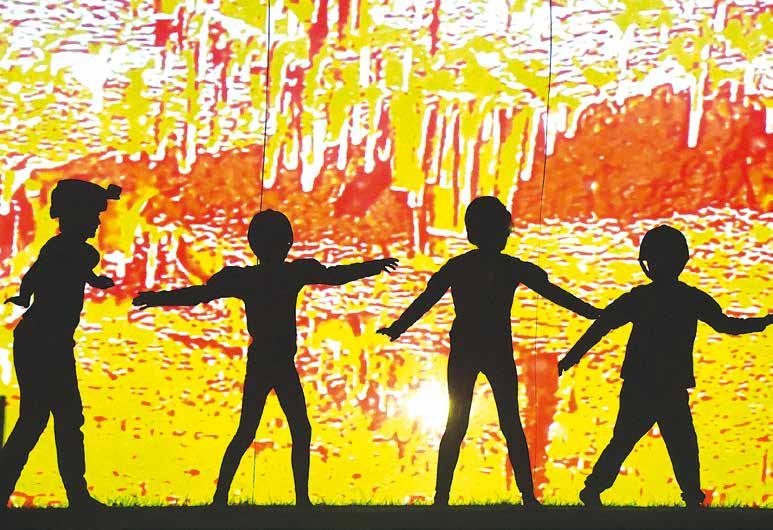
3 minute read
Festival lights up winter
Foodbank use increases
Over the last two years, demand for the Mohua Social Services (MSS) Foodbank has almost doubled. With a record average of 88 parcels going out each month (a total of 1056 parcels for the year), MSS has reached a tipping point whereby community donations need to be topped up by formal funding bodies.
Advertisement
MSS office manager Maria Koch acknowledges and thanks locals for their contribution. “There is a lot of community support – it is huge. Up until last year we managed well with community donations. But now demand has gone up, so we have had to organise outside funding.” One such source is the Community Organisation Grants Scheme (COGS) which is supporting MSS with a three-year funding agreement, currently in its first year.
The Foodbank regularly tops up to meet the community’s needs, spending around $2000 per month at the supermarket and local suppliers. “Part of food security is that we try to buy food locally to strengthen the local food economy,” says Maria.
Numerical and empirical evidence indicates that Golden Bay’s most vulnerable community members are struggling and increasingly seeking help (see Table 1, page 3). Maria explains that Foodbank is “for everyone who finds it hard to feed themselves or their whānau properly”.
Last Friday’s Community Light Festival wowed a large crowd on Tākaka’s Junction Green.
The outdoor celebration, organised by Golden Bay Community Arts Council (GBCAC), served up a mid-winter feast of music, light, fire and dance.
A forecast of rain for Saturday meant the event was brought forward a day – and it proved to be a good call. Although the cold air held a little drizzle, it failed to dampen spirits or cool festival-goers’ enthusiasm.
In the late afternoon, while waiting for the show to begin, the swelling crowd listened to (or in some cases chose to join in) the jam session happening at the jUteBox – a “jukebox” on a ute.
As the sun set, and the temperature fell, hot drinks, soup and tasty bites helped to keep out the cold. And there was time to check out awareness around the rhythms and cycles of the Maramataka Māori specific to Golden Bay. A long line of brightly coloured bowling balls, separately suspended by thin threads, were each decorated with symbols representing a particular phase in the lunar cycle, and positioned in sequence to depict the waxing and waning of the moon.
At 5.30pm, event co-ordinator, GBCAC arts worker Claire French, officially opened the proceedings, delivering a whaikōrero (formal speech in Te Reo) as well as a karakia and waiata performed with a group of Te Ataarangi students. Claire welcomed those present, outlined the evening’s schedule, and thanked the many sponsors, contributors and volunteer helpers.
Music and light then flooded the Green as Dance Collective Mohua’s The Light Fantastic took centre stage. The son et lumière was dominated by large multi-coloured backprojected images on which dancers were silhouetted – jet black figures painting their movements on a vivid canvas.
The performance told the story of the

Great Cosmic Mother’s magic teapot – a tangible symbol of the source of creation –which is taken by the Universal Trickster who travels around pouring out the uplifting and transformational “light fantastic” for those finding life hard. In one scene, for example, miners toiling underground are released from their misery by a tot from the teapot.
The modern projectors then gave way to an ancient source of illumination – fire. In a series of carefully choreographed routines, performers lit up the dark, weaving patterns with hand-held flaming torches and rings of fire. The flames’ radiant glow shone on the faces of the audience who were clearly rapt by the spectacle.
When the show closed, the crowd slowly dispersed, some moving on to the after-party at Roots Bar, while others headed for home.
The following afternoon, the festival concluded at the Village Theatre with a sellout “light” entertainment show featuring local talents in comedy circus, dance, music and poetry.
More photos on page 11
She says spending on food is frequently cut in order to meet other costs. “We [MSS] find with the rising cost of food and inflation people find it harder to pay for food. Often the priority is to pay for utilities and a food parcel alleviates the burden. What we see in Golden Bay is not unusual – it is happening all over the country. Sadly, in the last year we are starting to see more pensioners requesting parcels.”
A lot of thought goes into making up food parcels, explains Maria. “We try to provide varied food parcels, not just dry goods, and try to accommodate people’s preferences as much as reasonably possible. We work to meet nutritional standards for fruit, fibre and protein. It is also clear that we need to include [other basics such as] sanitary products and toiletries.”
The Foodbank has been in regular contact with the national body “Kore Hia Kai” (meaning zero hunger) which provides guidelines for standard food parcels and also works on wider food security issues.
MSS, Maria explains, has been funded by the Ministry for Social Development...






